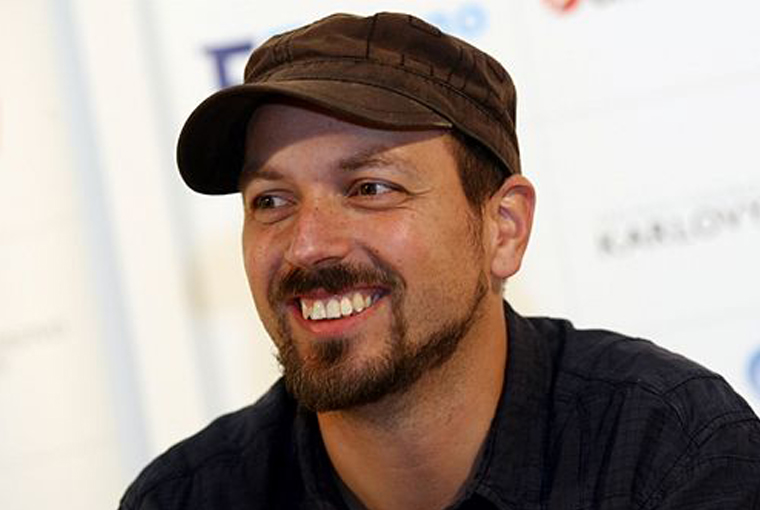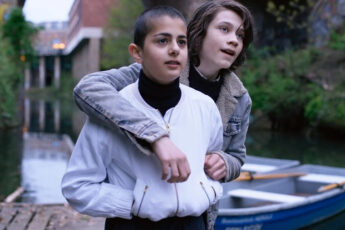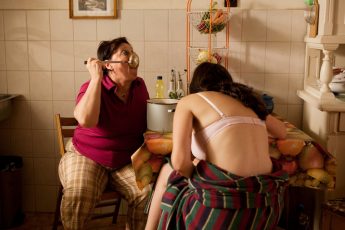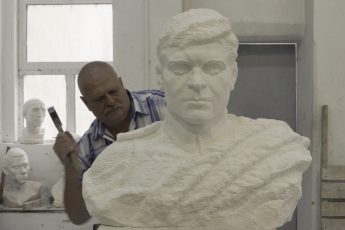
We met György Pálfi during the Transilvania International Film Festival (May 31-June 9), where he was part of the international jury. The Hungarian director speaks about his directorial style, the problems of political filmmaking, and where he sees Hungary today.
You said in an interview that the idea of “Final Cut – Ladies & Gentlemen” was to find a common theme in the 500 films you edited together. How well do you think your own films would fit into the “boy meets girl” narrative?
I think Ladies & Gentlemen is quite similar to my other films, just that the subject is different – this one is about love. But it’s an experimental movie, too. It is different from Taxidermia, Hukkle and I Am Not Your Friend in the sense that it’s more dreamy. It’s a chance for the audience to live out its fantasies.
You made the film because you had some money left from your previous film?
Correct. I had some extra money which I did not need for I Am Not Your Friend, so I decided to make another film. This way I ended up with two low-budget movies. The idea for Ladies & Gentlemen is simple, but we quickly realised that it’s a huge project. Actually, I was going to make another film, but when the government withdrew their funding, I took the budget I had and made Ladies & Gentlemen.
Do you want to continue making films in Hungary?
Yes. In France or Germany I would have to be lucky. If you go to another country to make films, you have to rebuild your career. It would take 2 or 3 years just to get to know people and make myself visible, and German and French filmmakers would ask why I should get money from their government.
Filmmaking is a very national thing. When you see a poster in the theatre or on the street, a question everybody will ask is: which country is it from? Of course, who made it is the first question that arises, but after that I think the country of origin is the main thing people care about. This is the way it goes. It’s really difficult to find funding abroad. If you have money already, then it’s different. Show people 30% of the budget, and France, Germany, Slovakia or whoever will finance it. During the funding hiatus in Hungary, we couldn’t even raise these 30%. It was a very difficult time for Hungarian filmmakers.
Recently, the Hungarian Film Fund has begun allocating grants again, but the system has changed, and is now headed by a government-appointed film commissioner. Do you think it has become more difficult to make films in Hungary today than it was 5 years ago?
No. Of course, the system was different. Now it’s a very autocratic system and usually Andy Vajna [the current film commissioner] will choose which projects should be supported himself, but the output is the same. The same projects get financed, and the same projects get made. The old system wasn’t very good either, even if it looked democratic because of the people who were involved. But it was autocratic, too. The new film fund doesn’t even try to look democratic.
That doesn’t quite fit the style of Orban. When he speaks in Brussels, he does appear to make commitments to the EU’s supposed values: there, his rhetorics are essentially democratic.
I am not a politician, but to me the film fund reflects the way the country works. It’s part of the way you think, how you manage your stuff. Every government has an ideology, whether they communicate it or not. In Hungary, we’ve seen a single-window system: one window, one person. You can apply for grants, but someone will decide over its future single-handedly.
Are filmmakers in Hungary fed up with politics?
The problem is that politicians try to invade our personal territory. Personally, I don’t understand why. Politically, I do, but not on a personal level. There is too much government, too many policies that impact my personal life. I don’t want it to be that way, but I have to deal with it. They want to have a say on everything, even on what happens with culture. It’s a small country with huge taxes and hence everything depends on the government. If you want to realise a project, they are who you must turn to. That’s one reason why some people try to keep a distance and don’t want to comment on everything that is happening. It is possible that you won’t get funded if you open your mouth too wide. It’s not a dictatorship – they won’t jail you. But you need their help, and they know it.
That doesn’t sound like very good prospects for political filmmaking in Europe. We haven’t seen a lot of anti-Fidesz films coming from Hungary, even if a counter-movement clearly exists.
My life is short. I don’t want to dedicate my life to political filmmaking. I think my resonsibility is to make more universal, more human stories. Politicians are afraid of auteurs, even if many auteurs only talk about love, humanity etc. Many conservative politicans have a very clear idea of how we should live our lives. When I make an auteur film, it disturbs them. A problem of political cinema is that filmmaking in general is a very long process. It takes 3 or 4 years to make a movie, in Eastern Europe it can take up to 7. If I speak about a person or a government today, he’ll be gone by the time I finish.
But in Hungary, this situation didn’t start in 2010. With Fidesz, we have seen a more dramatic downward shift in less time, but it’s a young democracy which has problems that reach many years back. The leftist governments since 1989 are culpable of bad governance and heavy corruption themselves. In Romania, directors have succeeded in addressing social and political problems without reducing them to figures or parties, so it’s possible. Don’t you think Hungarian filmmakers are simply – for whatever reasons – less self-reflexive? Is there a national identity in Hungarian cinema?
That’s a good question. Romanian cinema is very strong and based on its own identity. This is indeed one of our biggest problems: we can’t find a real identity. It is difficult to contrast Hungarian cinema to that of countries around it. You can say we speak Hungarian and they don’t, but that won’t get you very far. I think this partly goes back to what I said before, that film is very slow. Theatre and performance are faster and hence more reactionary. That’s why it’s so important for theatre to speak about politics: there is a problem, and a couple of weeks later you can have a premiere where you address it. But when I start a movie and try to address it, by the time I finish it might already be too late.
So the way you choose a topic is finding something that will interest you for 7 years?
Yes. It must be something that will fascinate me for my entire life. I choose subjects and themes that won’t ever bore me, and that’s simply not the case with politics.
Hungarians also seem to have dealt with the revolution less explicitly and less rigorously than Romanian directors have.
We try. There are some films which succeed in talking about it in an interesting way, I think the best one is Ferenc Török’s Moscow Square. Again, it’s a question of identity. In Romania, you had a hard-core dictatorship, in Hungary it was something similar to today’s system. Basically, the difference lies in the title: then it was called socialism, and today, it’s not really a democracy because the current government destroyed the name by taking out “Republic” from the title, so I don’t know. We’re consumers now, and then we weren’t, but then there are many people who think there was more social safety than there is nowadays.
The over-preoccupation with names and with what you call things, that’s very Eastern European.
Yes, we’re a strange group. We like fighting with ourselves. I don’t know why.
“Hukkle” and “Taxidermia” have many stylistic parallels. Do you consider yourself to be a theoretical director with a strong artistic vision, or did that happen by accident?
The auteur wants to make the best films he can make. But there are limits. You want to make everything, but you can’t. To me, the working method is very important. When I find a subject, feeling or momentum, first I try to find a way to get to the audience. The audience is the target. I have to find something that can be communicated by way of cinema. This is the main question: how do I want to make my movie? There are many ways: many techniques, many styles etc. The American way is quite straightforward. You write a script, choose the right actors, a professional crew and then you begin working on it. This is the factory way, but you can make films a million different ways. That’s what I like.
For Hukkle, there was no script, only a 16-page concept. I went to the village, spent a year and a half there, looked for the right people, the right locations. There was no wardrobe, no make-up. Just the camera. I shot what I found there, so it’s quite a different approach. For I Am Not Your Friend, I worked without a script once more. At a screening in the Netherlands, someone from the audience told me that the film would be even better if there hadn’t been a script. You can’t tell, but there really was no script. The actors decided what they wanted to do. All I gave them was a situation, an impulse: who are you, what is your connection to this guy?
Do you think it’s wrong to regard nature and the human body as beautiful? “Hukkle” and “Taxidermia” de-aestheticize quite willingfully.
Nature is beautiful, but a lot about it is rotten. It’s a combination. In Taxidermia, the question was precisely this: what is beauty? Is the body ugly on the inside? No, it’s beautiful, it’s a whole universe of flesh and blood. You can look at it both ways.
Do you think in Eastern Europe the gap between director and audience is bigger than in France or other countries where domestic audiences are larger?
It depends. Most directors whom I’ve met want to make films for their own audiences. They want to communicate with them. I don’t like saying this, but I think the culture of watching films varies greatly. Unfortunately, you won’t find it everywhere. It is difficult to understand what an abstract museum exhibit, say a big blue screen on a wall in a museum, means. A lot of people don’t. If you don’t know what happened in art history, it will be difficult to fathom what is intended by the screen, that it was the right moment in history to paint a blue screen on a wall.
It’s the same with movies. The filmmakers’ language is not universally accessible, it has evolved over years. It’s becoming more complex, faster. In the 1930s or 1950s they used 600 shots for their films, now they sometimes use up to 2500. The technical stuff, the digital revolution, has also changed the medium and allowed it to be executed differently. The audience expects this from filmmakers.
Do you think the lack of communication between filmmaker and audience points to poor film criticism? Isn’t it part of the job of a film critic to deciphre films, to make them accessible?
I think they can’t. Most people read reviews to decide whether they should go to the cinema or not. And obviously, there is the old problem with deciding whether you want to be entertained or see art…
…where you want to give both?
Yes, I try to find a way in between. My idea is to make films with different layers: one layer will work for all audiences, then there will be another layer that is rhytmic, the third is narrative etc. That way, everyone should find something for themselves.
Do you have any upcoming projects?
Yes, and it seems that the Film Fund has finally reached some decisions after two years of waiting. I’m starting work next week. It will be a historic film about Hungary and a hero from the 13th century.
But still not political…
I want to make a film about the hero. He has a connection to the king, so there might be some politics involved.
Thank you for the interview.




what software did he use to edit ‘Final Cut’? it wasn’t Apple’s ‘Final Cut’ or was it? how many hours did it take to make from start to finish?